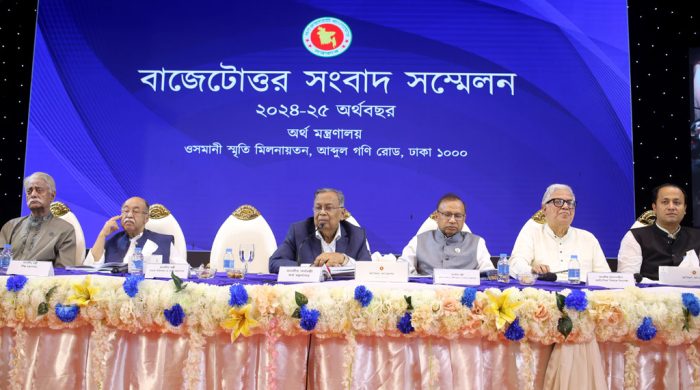Govt seeks six months to curb inflation

- Update Time : Saturday, June 8, 2024
- 23 Time View

The government has proposed the reintroduction of undisclosed money legalisation scopes in the new national budget to appease businessmen, officials said on Friday.
In the traditional post-budget press briefing attended by finance minister Abul Hassan Mahmood Ali, the government authorities called the other proposed measures, like inflation at 6.5 per cent, bank borrowing, and revenue growth, ‘realistic and manageable.’
Assisted by more than half a dozen ministers and state ministers, an adviser, and senior secretaries, the finance minister said the country should wait six months to see inflation come down in line with the measures proposed in the budget.
The finance minister, however, expressed resentment over repeated questions linked to capital flight, defaulted loans, the price spiral of essentials, and the overall prolonged economic crisis.
‘I expect more mature questions,’ he said while answering a question about the size of the budget and people’s distress against the backdrop of the sharp appreciation of the dollar and the high inflation prevailing over the past 23 months.
Calling such calculations ‘oversimplification’, the agitated finance minister said that the economy ran under different dynamics. ‘Do study,’ he said.
Earlier, National Board of Revenue chairman Abu Hena Md Rahmatul Muneem said that the demand by the business forced the government to reintroduce undisclosed money legalisation scopes at 15 per cent tax.
The proposed amnesty for errant taxpayers has already sparked criticism since regular taxpayers have been proposed to pay up to 30 per cent income tax in the new financial year beginning on July 1.
Dismissing the perception of ‘whitening black money’ through such scope, the NBR chairman said that the undisclosed money was generated in the country for many reasons, including sales of land assets.
No authority will raise any question if any taxpayer or company pays a 15 per cent tax on cash, bank deposits, financial securities, or any other forms of wealth, said the finance minister in his budget speech.
But the rate will be higher for commercial spaces.
Answering a question about whether former police chief Benazir Ahmed can avail himself of the scope for legalising undisclosed assets and money under the scheme, the NBR chairman said that persons facing criminal offences would not be able to enjoy such amnesty.
Earlier, economic affairs adviser to the prime minister, Mashiur Rahman, while responding to a similar question, said the Anti-Corruption Commission had been taking action against the former police chief.
He added that every citizen should have the privilege to enjoy state facilities.
Last time in FY21, the NBR offered a similar scope for errant taxpayers to invest in stock markets and real estate by paying a 10 per cent tax, despite widespread criticism that such scopes were discriminatory against honest taxpayers.
The economic adviser also said that the government was trying to solve the problem in the banking sector without closing down any banks.
The finance minister read a scripted speech before the question-and-answer session.
He dismissed an apprehension that private sector credit would be affected due to projected borrowing to meet the budget deficit.
Many developed countries resort to higher borrowing, he said, adding that they decided to keep the budget deficit below 5 per cent so that no price pressure occurred.
Finance secretary Khairuzzaman Mozumder said that there was no link between liquidity crises in the banking sector and the borrowing target for FY25.
Bangladesh Bank governor Abdur Rauf Chowdhury was present at the briefing, but he refrained from speaking in the press conference or answering any question following the decision of the Economic Reporters’ Forum, which announced to boycott him protesting at restriction imposed on reporters to enter BB.
The state minister for finance, Waseqa Ayesha Khan, pointed out that the introduction of the crawling peg was not the only basis for the expectation that the country’s forex reserves would improve in FY25.
She said that the government had introduced off-shore banking with a lucrative interest rate and easy facilities, which would help increase forex reserves.
The country’s forex reserves fell to $18 billion from $48 billion in August 2021, forcing the government to borrow $4.7 billion from the International Monetary Fund.
The IMF has already disbursed $1.1 billion and hinted at the disbursement of $1.15 billion in the current month.
The state minister hoped that revenue would increase substantially, allowing the government to better deal with the economic crisis.
State minister for commerce Ahsanul Islam Titu narrated the measures in the budget to check the price hikes on essentials.
He said that fair-priced shops would be introduced in FY25 to check for price hikes on essentials.















